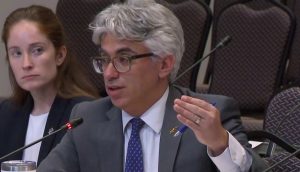PHD global strategy and planning director Mark Holden spoke about the future this week in Cannes in a session called Beyond the Horizon, which whizzed through all the nascent tech – from markerless AR to haptic feedback – and how it will change everything from how people connect to how marketing works.
Holden believes all of the innovation signifies a bigger movement for brands becoming content creators, and says that although linear TV will be around for a long time, what’s interesting is the IPTV overlay. He adds that a whole new group of emerging skill sets are coming online, and that they’ve invested a lot to get the right talent in, predicting that “by 2016 most media agencies will be full-service content agencies.”
PHD has long had a fascination with tech, thought leadership and creativity, from its FMRI-based neuroplanning, books, creativity training and a conference room made of Lego, to this year’s app at Cannes.
MiC sat down with Holden and PHD CEO Mike Cooper to talk about the here and now, and how media agencies are evolving in the vortex of change.
What is the PHD network all about?
Mike Cooper: In many ways we’re one of the world’s most recent global networks, although PHD has a real heritage,
unlike a lot other invented brands, most of which seem to start with an M, but that’s for media I suppose.
When PHD was established in the UK, it was around the same time that Zenith was established. Zenith was just buying initially. PHD was set up really as the antithesis of that. We do buying as well, but our emphasis was more on the branding side and we’ve tried to stay true to that. So, as we’ve rolled out globally, we’ve tried really hard to continue with that approach. With all the work we’ve done, particularly in Mark’s area, all the strategy and planning work, we try to position PHD as the thought leader agency.
Whenever there’s a debate about the future of media, marketing, advertising, or the future of technology as applied to marketing, we try very hard to be in that space. We’re known for that. Clients come to us when they want to know about the future. You’ve got to own the future in terms of media. That’s a very good place to be. Everything we do in terms of marketing a brand tries to reflect that.
Mark Holden: Because PHD’s essence is about finding a better way and pioneering, it’s important that we have a view on the future, where business is going. So, we’ve very deliberately started to try to make a prediction about where the
business might go and the only way of really doing that is to understand all the forces at play, and of all the forces, the biggest one is really technology. Of all the other drivers of change that’s the only one that really makes a difference. So, we have spent time looking at all the technologies that are emerging in the labs, or prototypes, and we take a view on what technologies are likely to come to fruition and then we use that to figure out what might happen to media and what might happen to us as an agency and how we need to change ourselves.
If you’re in a category that’s under resourced, low interest and undifferentiated you need to be polarizing.
“Owning the Future” is an interesting USP. Do you think the “M” media agencies branded themselves uniquely?
Cooper : No, I don’t. We do the exercise regularly, looking at all the logos and thinking about everybody, and I mean frankly, I think the key is to try really hard to put yourself in a client’s shoes. You think like a client and you’re looking at this sea of logos, reds and blues and oranges and whatever else, none of them really say anything very interesting about themselves. If we stand out, if we’re different it might mean that we’re not for everybody. It might be that some people want a big, bland, safe media network to look after their business, but I don’t think there are many advertisers that think like that.
What are your thoughts on the successes of PHD and Touche!PHD in Canada?
Cooper: They’ve had some really good wins. I think what they’ve done, which is right, is they’ve focused on being a really high quality operation and both those offices, PHD in Toronto and Touche!PHD in Montreal, they turn out some excellent work. They have some extremely strong talent. I notice when I go there that they seem to have incredible consistency with their people. They both seem to have very low staff turnover, especially at the more senior level. They focus on the end product.
What mandate do you extend to your staff globally?
Cooper: What we encourage people to do everywhere is to focus on the quality of the work, then you attract clients and the size issue really takes care of itself. I look at some of our competitors who are a lot larger than we are. I think it’s quite hard to maintain that standard of quality in terms of the people, in terms of the work, in terms of the output. If you have the objective of just growing and growing and growing it’s almost like one cancels out the other.
























